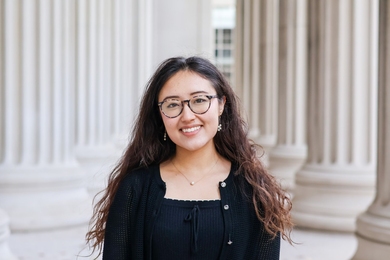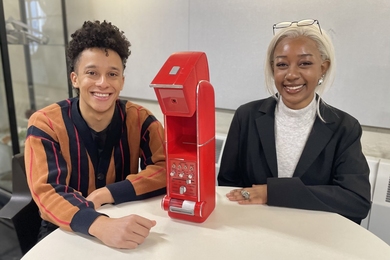A new master’s degree in data, economics, and development policy (DEDP), announced today by MIT and offered by its renowned Department of Economics, represents a new path to earning an MIT master’s degree. The program is the first to be available solely to online learners who have earned another new credential, the MITx MicroMasters in DEDP, also announced today by the Institute.
The MicroMasters program is open to anyone in the world. Its courses are offered online via edX by faculty based at MIT’s Department of Economics, widely recognized as the global center of research in development economics, and the Abdul Latif Jameel Poverty Action Lab (J-PAL), a world leader in policy-relevant research. Students who perform exceptionally well in the MicroMasters program in DEDP may be eligible to continue their education on campus at MIT, ultimately earning a master’s degree — the first to be offered by MIT’s Department of Economics. The MicroMasters program is now open for enrollment for courses beginning in February 2017; the DEDP master’s degree will launch in 2019.
Performance in the online MicroMasters in DEDP will be a key selection criterion for those students who complete this program and then apply to the MIT master’s program. Upon acceptance, these students’ online work will be converted to credit and they will come to MIT for a single semester to earn an accelerated master’s. In the summer following their semester in Cambridge, Massachusetts, they will also complete a capstone experience — consisting of an internship and corresponding project report — to apply the skills they have acquired. Through this unique “inverted” admissions process, the blended master’s program opens new doors for those seeking education at MIT.
“Policymakers, NGO activists, and businesspeople in developing countries are increasingly aware of the importance of good data and rigorous evidence for designing and choosing policies and projects — and implementing them effectively,” says Esther Duflo, the Abdul Latif Jameel Professor of Poverty Alleviation and Development Economics in the Department of Economics. “To become good producers and consumers of evidence, they need staff with a strong quantitative and analytical background. Today, few programs provide such training, and the available options are expensive and time-consuming. The blended master’s in DEDP, anchored at MIT, the home of J-PAL, is an ideal solution to this challenge.”
A program 15 years in the making
“The world of development policy has become more and more evidence-based over the past 10-15 years,” says professor of economics Ben Olken, who co-created the MicroMasters in DEDP program with Duflo and Ford Professor of Economics Abhijit Banerjee. “Development practitioners need to understand not just development issues, but how to analyze them rigorously using data. This program is designed to help fill that gap.”
This decade-and-a-half shift toward practical, empirical research and rigorous impact-evaluation methods aligns with the broader international development community’s focus on evidence-based policy and results-based development. Ever-evolving dynamics within developing countries, institutional challenges inherent in poverty, and the rising costs of economic intervention — which can run to billions of dollars — have made development policy increasingly complex.
To navigate these new realities, the governments and organizations responsible for implementing poverty relief programs must build their capacity and capabilities. The MicroMasters program and master’s in DEDP help to answer this demand and strengthen local capacity to produce and understand empirical research.
“I’ve worked in government and international agencies, and know how important a thorough grounding in economics and data analysis is to good policymaking,” says Rachel Glennerster, executive director of J-PAL. “Our aim with this MicroMasters is to give people — wherever they are in the world — the skills they need to bring the best analytical tools and empirical evidence to bear to help solve the world’s most pressing problems."
A longtime advocate for reducing poverty through evidence-based policy, J-PAL is well-suited to collaborate on the new programs. The organization has developed customized training sessions for a wide range of groups, including the International Labor Organization, UNICEF India, and the government of Gabon.
A major step for MicroMasters
MIT launched the first MITx MicroMasters credential, the MicroMasters in supply chain management, in October 2015. Since then, over a dozen universities have adopted the MicroMasters model, which enables online learners to take a semester’s worth of master’s-level courses on the edX platform, then complete a master’s degree in an accelerated path on campus.
The MicroMasters in DEDP brings innovation one step further by offering a brand new pricing structure based solely on income. Students are charged a personalized course fee determined by their ability to pay, no matter where in the world they live. There are no formal prerequisites for enrolling in the MicroMasters, which removes a major barrier in access to education, and the number of courses a learner takes at one time is flexible as well.
The MicroMasters in DEDP equips students with the practical skills and theoretical knowledge to tackle some of the most pressing challenges facing developing countries and the world’s poor. Through five online courses and five in-person proctored exams at facilities around the globe, the MicroMasters in DEDP prepares learners to bring a data-driven perspective to development policy.
Students will acquire a theoretical foundation in microeconomics, probability, and statistics while gaining practical experience through exposure to real-life scenarios and step-by-step training on how to conduct randomized controlled evaluations, a method used by J-PAL affiliates to measure the impact of a policy or program. Learners will also develop the ability to carry out the economic analyses of programs, get involved in hands-on data analysis, and acquire key skills needed to run randomized evaluations in the field.
“Students who earn the MicroMasters credential and master’s degree in DEDP will come out ready to be leaders in their field and to change the world,” says Duflo. “They’ll acquire the tools to be creative, analytical thinkers who will reinvent antipoverty policy. And they’ll gain the courage and skills to put all their ideas to the test, and fail, and try again until they succeed.”
“My ideal world is one where development practitioners come at whatever they are doing as a matter of solving a problem with the best tools, sharpest ideas, and the most sophisticated learning strategies available to them,” says Banerjee. “Poverty is a solvable problem, as long as we have the patience to keep trying and the will and the clarity to keep learning from our experience; I hope that this program will serve as a midwife to that process.”











